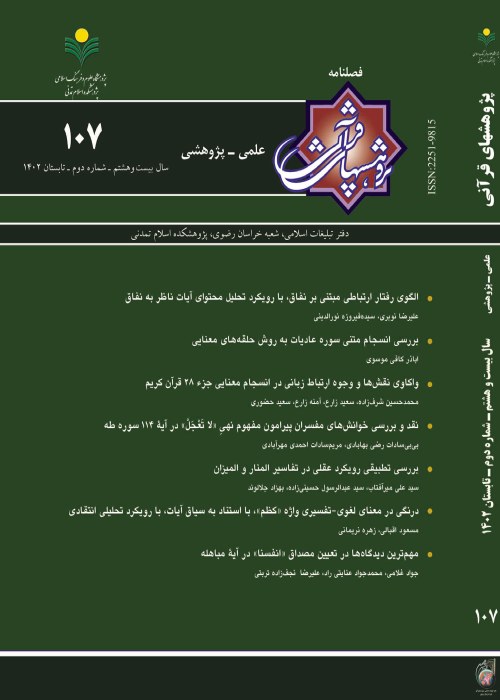Affinity of the Qur'an's Positive and Normative Propositions in the Realm of Economy
Author(s):
Article Type:
Research/Original Article (بدون رتبه معتبر)
Abstract:
For a long time the scientific community has been trying to render knowledge free from values so that the knowledge freed from judgments and personal presuppositions would achieve popularity and faster expansion.
In economy, likewise, this separation has for long prevailed in the form of positive and normative economy, either as a science or school. The separation has caused many value convictions to be disfavored in modern formats and the two areas move apart from each other and to be deprived of constructive interaction.
This article deals with the two above-mentioned areas, namely positive and normative propositions. Positive proposition means any statement fit to be approved, disapproved, rejected, and proved in view to external realities. In other word, positive propositions talk about "is's and is nots" and express external realities. In contrast, normative propositions deal with "musts and must nots" and the values. In respect to normative propositions of Islam, i.e., Islamic ordinances, Muslim thinkers have believed in their affinity to the positive propositions, which have been dealt with under the heading of the "expedience" and "innate corruption" of ordinances in legal and theological discourses.
This research intends to explore into and extract external realities where the Qur'an has explicitly talked about them in cause-effect relations or about the "is's" in the realm of economic issues, whether in relation to philosophy of ordinances or independently. These propositions have been divided into four categories as follows: those suggesting the impact of economic factors in other individual and social fields; those suggesting the impact of factors effecting economic issues; those suggesting economic behaviors; and those suggesting Divine traditions and laws in general, which govern the economic issues as well.
In economy, likewise, this separation has for long prevailed in the form of positive and normative economy, either as a science or school. The separation has caused many value convictions to be disfavored in modern formats and the two areas move apart from each other and to be deprived of constructive interaction.
This article deals with the two above-mentioned areas, namely positive and normative propositions. Positive proposition means any statement fit to be approved, disapproved, rejected, and proved in view to external realities. In other word, positive propositions talk about "is's and is nots" and express external realities. In contrast, normative propositions deal with "musts and must nots" and the values. In respect to normative propositions of Islam, i.e., Islamic ordinances, Muslim thinkers have believed in their affinity to the positive propositions, which have been dealt with under the heading of the "expedience" and "innate corruption" of ordinances in legal and theological discourses.
This research intends to explore into and extract external realities where the Qur'an has explicitly talked about them in cause-effect relations or about the "is's" in the realm of economic issues, whether in relation to philosophy of ordinances or independently. These propositions have been divided into four categories as follows: those suggesting the impact of economic factors in other individual and social fields; those suggesting the impact of factors effecting economic issues; those suggesting economic behaviors; and those suggesting Divine traditions and laws in general, which govern the economic issues as well.
Language:
Persian
Published:
Qur'anic Researches, Volume:12 Issue: 1, 2006
Pages:
48 to 89
magiran.com/p2260214
دانلود و مطالعه متن این مقاله با یکی از روشهای زیر امکان پذیر است:
اشتراک شخصی
با عضویت و پرداخت آنلاین حق اشتراک یکساله به مبلغ 1,390,000ريال میتوانید 70 عنوان مطلب دانلود کنید!
اشتراک سازمانی
به کتابخانه دانشگاه یا محل کار خود پیشنهاد کنید تا اشتراک سازمانی این پایگاه را برای دسترسی نامحدود همه کاربران به متن مطالب تهیه نمایند!
توجه!
- حق عضویت دریافتی صرف حمایت از نشریات عضو و نگهداری، تکمیل و توسعه مگیران میشود.
- پرداخت حق اشتراک و دانلود مقالات اجازه بازنشر آن در سایر رسانههای چاپی و دیجیتال را به کاربر نمیدهد.
In order to view content subscription is required
Personal subscription
Subscribe magiran.com for 70 € euros via PayPal and download 70 articles during a year.
Organization subscription
Please contact us to subscribe your university or library for unlimited access!


